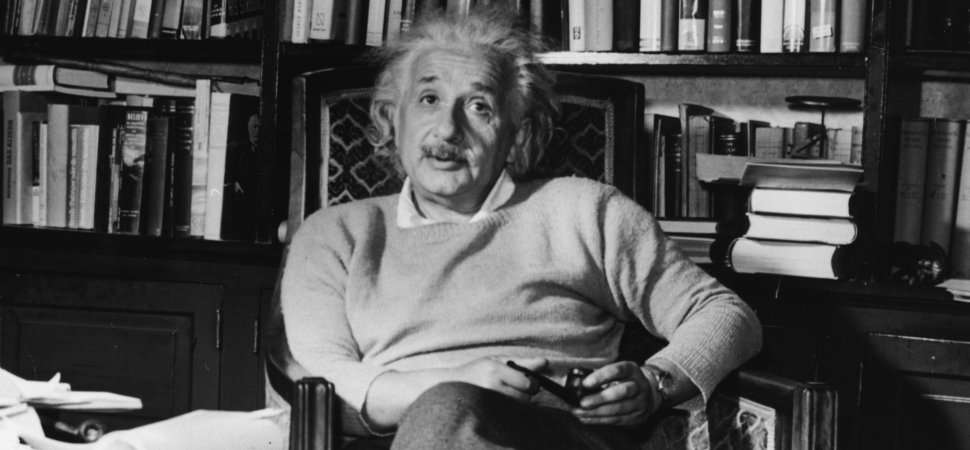We still don't completely understand how the brain works and yet we're building machines to replicate it. Our quest to create artificial intelligence has grown into a near-frenzy as we surge ahead with unprecedented progress. But will we really reach the finishing line?
Any hope of success will depend on our ability to answer one simple question: What exactly is intelligence?
In 1985, American scientist Marian Diamond studied the brain of Albert Einstein and found an answer.
We're used to talking about neurons when referring to the brain, but we also have what are called glial cells. In Greek, glia means "glue." Glial cells were given their name because we thought they did little more than just hold the brain together. One kind of glial cell is the star-shaped astrocyte.
In 1985, Diamond's findings were almost disappointing. Einstein's brain did not contain more neurons overall than the average person's. It did, however, contain more astrocytes, in the left inferior parietal area of the brain, a region associated with mathematical thinking.
Since intelligence was assigned to neurons and astrocytes were thought to be little more than "glue," this finding did not make headline news and was largely ignored.
What did Einstein's brain actually reveal?
If you insert human astrocytes into the brains of newborn mice, they grow up to be more intelligent. Their learning and memory are significantly sharper. It's only in the past few years that we've come to understand the extraordinary reason why.
We have always assumed that a synapse, the point where two brain cells join to carry information, is made up of two brain cells. We were wrong. A synapse is made of two brain cells -- and an astrocyte.
Astrocytes nurture synapses. Not only are they key in synaptic plasticity, but they are plastic themselves. They grow and change. One astrocyte can be in contact with two million synapses, coordinating their activity and plasticity across vast realms of the human brain -- and contributing to our intelligence.
How do astrocytes figure in artificial intelligence?
Artificial intelligence researchers from the University of A Coruña in Spain recently improved neural network performance by using an algorithm that included artificial astrocytes. When a neuron's activity reached a maximum, the astrocyte was activated. It increased the weight of the neuron's connections with the neurons of the adjacent layer by 25 percent, simulating what might happen in real life.
If Einstein was a genius because of his astrocytes, can we increase our astrocyte numbers and become geniuses too?
As early as 1966, Diamond and her team demonstrated that putting young rats in a stimulating environment rich with challenge and new experiences increased glial cells.
We now know that this even happens in elderly mice. Putting aged mice in an "enriched environment" increases astrocyte numbers and complexity, which correlates with better cognitive performance.
If you're wondering, the effect is also seen in humans.
A study published this year followed production workers at a factory in Germany for 17 years. The volume of brain regions associated with executive function and motivation was larger in those who had been exposed to recurrent novelty in their work. This was associated with better cognitive performance at middle age.
Plasticity takes energy and effort and our brains are lazy. They don't want to try to "grow" without good reason. Challenge and novelty tempt the brain with a reason to try.
During her career as a professor of integrative biology at the University of California, Berkeley, Diamond concluded that five factors were crucial for healthy astrocytes -- and for the human brain to thrive at any age: a good diet, exercise, challenge, novelty -- and love (she noticed the mice in her lab lived longer and did better when cuddled).
Focusing on these five things can increase stress resilience and keep you mentally sharp. If you're leading a team, you may not be able to change everyone's diet and exercise routines or show love, but you can make sure your team has ample opportunities for "newness" and challenge. Minimize repetitiveness and standardization and encourage employees to learn and master new things outside of their skill set.
Astrocytes are one thread in the complex tapestry of intelligence, but our growing knowledge about astrocytes has made intelligence a little less baffling today than it was a few years ago.

PM_ME_UR_FEM_PENIS on July 17th, 2018 at 16:20 UTC »
>good diet
Oh.
>excercise
Oh.
>and love
Ok fuck you
TooShiftyForYou on July 17th, 2018 at 13:58 UTC »
After his death, Einstein's brain went missing for 23 years until it was tracked down by a reporter.
Story
EL_CHEETO_BURRITO on July 17th, 2018 at 13:37 UTC »
Two outta three ain't bad